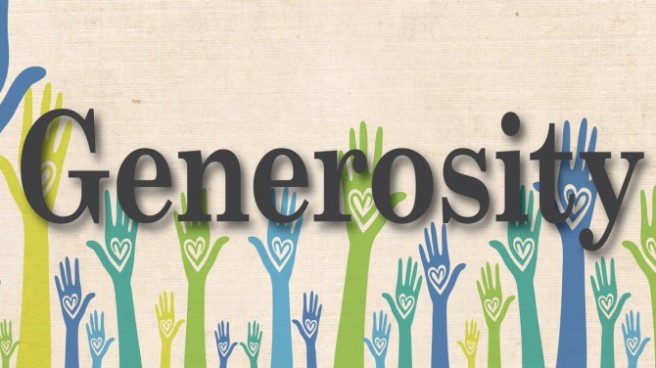Can you imagine people giving so generously that the Jewish community would say, “Stop! There is no need to give further. We have all we need to care for our community”?! Essentially, this is what happens in this week’s parasha, Vayakhel, where the Israelites give more than is needed for the building of the sanctuary (mishkan) and are instructed by Moses not to give more.
 What is generosity?
What is generosity?
Generosity is a behavior that is learned, cultivated, refined through practice and transmitted through modeling. Our generosity is influenced by the generosity of our peers; it is also a reflection that we care about others. At the same time, our sages recognize the challenge of balancing our own needs with the needs of others. This giving is not always about amount, but often about giving according to capacity. In this way, one’s “success” can be measured by what one gives rather than what one has.
 There are two notions of generosity in Judaism. The first is Tzedakah, which comes from the root for justice. This suggests that giving so that people of every age and from every life circumstance can live with dignity. Today, many people call such giving either philanthropy or charity.
There are two notions of generosity in Judaism. The first is Tzedakah, which comes from the root for justice. This suggests that giving so that people of every age and from every life circumstance can live with dignity. Today, many people call such giving either philanthropy or charity.
The other type of generosity, Nedivut, is about quality, not quantity. Hospitality is a good example of having a generous heart. It is the wealth of our spirit that shows others we care. The following text captures this beautifully:
R. Zakkai told his five disciples to find the chief characteristic a person should cultivate.
R. Eliezer said, “A friendly eye.”
R. Joshua said, “A good friend.”
R. Yose said, “A good neighbor.”
R. Simon said, “Seeing the consequences of one’s acts.”
R. Elazar b. Arakh said, “A good heart.”
R. Yohanan responded, “I prefer Elazar’s answer because it will lead to all the rest.” (Avot 2:9)
A medieval compilation of Jewish ethical teachings, Orchot Tzdikim, says: “There are three kinds of generosity: generosity with money, with one’s body, and generosity with one’s wisdom.”
k Today one does not have to look far to realize that there are many who once had plenty but now do not have enough; there are those who once managed to “get by”, but now cannot manage alone. How we respond as a community says everything about the intention of our hearts. A contemporary rabbi writes: “When we feel certain solidarity with others, we want to share our possessions and, more importantly, ourselves with them.”
Today one does not have to look far to realize that there are many who once had plenty but now do not have enough; there are those who once managed to “get by”, but now cannot manage alone. How we respond as a community says everything about the intention of our hearts. A contemporary rabbi writes: “When we feel certain solidarity with others, we want to share our possessions and, more importantly, ourselves with them.”
 So we return to the opening word, “Vayakhel “, which connects to the Hebrew word for community, Kehilla, and is used only for assembling human beings. Here is a contemporary read on this verse: “And Moses unified the people together as one community with a shared purpose” (Ex. 35:1).
So we return to the opening word, “Vayakhel “, which connects to the Hebrew word for community, Kehilla, and is used only for assembling human beings. Here is a contemporary read on this verse: “And Moses unified the people together as one community with a shared purpose” (Ex. 35:1).
 This does not say one community of identical beliefs and practices. Rather, that what unifies us as Jews, and ultimately as human beings, is our ability to incline our hearts toward one another – with kindness, generosity, and love – to inspire and support one another in the quest for healing and peace – for all of God’s creatures and for the planet with which we have been entrusted. May this be the mishkan we build – a sanctuary for all.
This does not say one community of identical beliefs and practices. Rather, that what unifies us as Jews, and ultimately as human beings, is our ability to incline our hearts toward one another – with kindness, generosity, and love – to inspire and support one another in the quest for healing and peace – for all of God’s creatures and for the planet with which we have been entrusted. May this be the mishkan we build – a sanctuary for all.
Shabbat Shalom
Nina J. Mizrahi, Community Rabbi
Vayakhel-Pekudei 5777
straight forward and to the heart, thank you. shabbat shalom
LikeLike